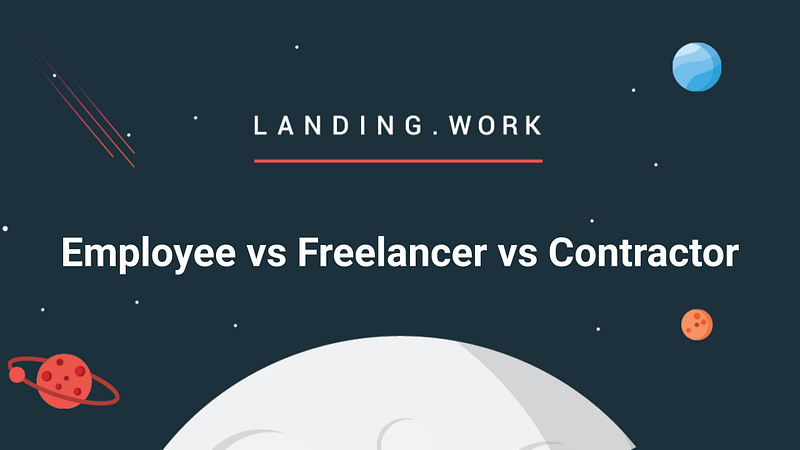
Last week, we hosted the First Landing.work Webinar. Since we just launched our beta, more details on our last blog post (here), we decided that it was important to tackle the topic on the title and discuss the differences between Employee, Freelancer, and Contractor.
There is some confusion between these types of employment and we wanted to smooth out possible doubts and help everyone make the right career shift.
We held a roundtable discussion about the topic and we assembled the following people:
- Moderator: Pedro Oliveira — Co-founder at Landing
- Employee: Yolanda Correia — Senior Android Engineer at Samsung Electronics
- Freelancer: Duarte Gameiro — Yoga Teacher
- Contractor: Tiago Martins — Owner at Fullstack Works
After one hour-discussion around topics like schedule, pricing, self-development, and the contractor career path, we want to share with you some of the main conclusions we reached:
- For Yolanda, who recently shifted from being an outsourcing Employee to a Contractor, the main differences were felt in her career. With contracts being shorter timeline-wise, you need to start planning the buffer period you’ll need before finishing a project and finding the next one. Your career progression starts simply by being motivated and working on something that is meaningful to you, but she advises you to use the projects you work on to be a step in your technical evolution and to take the risk if you’re thinking about it. As a Contractor, her main struggle was negotiating rates, so she believes that having recommendations on fiscal matters and support on pricing negotiation is a Must-have when you shift to contracting. Guess what? We do that on Landing.work 😉
- Freelancing requires a lot of your own personal investment. Our own Freelancer, Duarte, mentioned the positive thing about freelancing is the flexibility he gets on having the possibility to choose between working fewer hours in any given day, and more hours on the next one. But it isn’t easy to maintain work-life balance and you need to be very assertive about what you’re good at. The quality of your work is the only argument you have to find new clients or retain existing ones. When a better gig shows up, it’s time to change to better conditions because the relationship you develop with clients is not as close as the Contractor-Client relationship. On Landing.work, we make sure the client-contractor relationship is as transparent and as close as possible so you can work on the projects you want for as long as you want.
- Finally, going back to the contracting side of things, Miguel says the favorite part of his work is being remote. The time he doesn’t spend on commuting now is one of the main drivers that contributed to a better work-life balance. In his opinion, 6-months projects are ideal and he tries to have a daily routine of work on his home-office, even though sometimes that may need to be adapted due to working with clients in different time-zones. His main advice is to be conscious of the rates you set for your own work. Besides having the monthly salary net needed plus taxes and social security, he always includes a risk factor in his pricing. He also adds the same input as Yolanda, make sure to manage the time you’ll need to find a new client when finishing with your actual one. So, make sure you’re registered on Landing.work and we’ll have all the trouble in finding you your next projects — so you can focus on work wiser and upskilling instead of searching for clients.
We believe it was a great experience for everyone involved and the feedback so far has been really good. If you want to watch it again, you can do it here.
Pro-tip: there were some really insightful conversations in the comment section as well.
Aim for more,
Pedro Oliveira
Co-founder at Landing






0 Comments